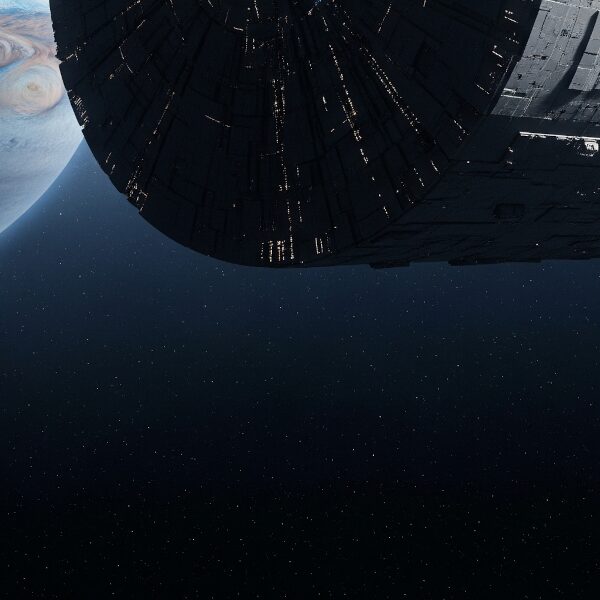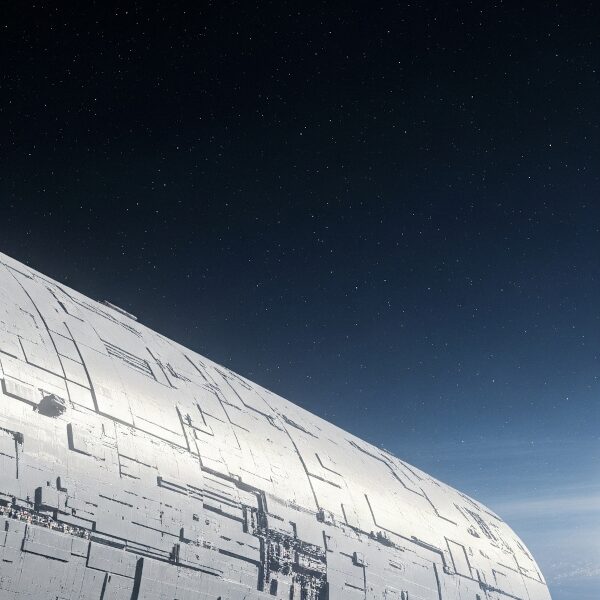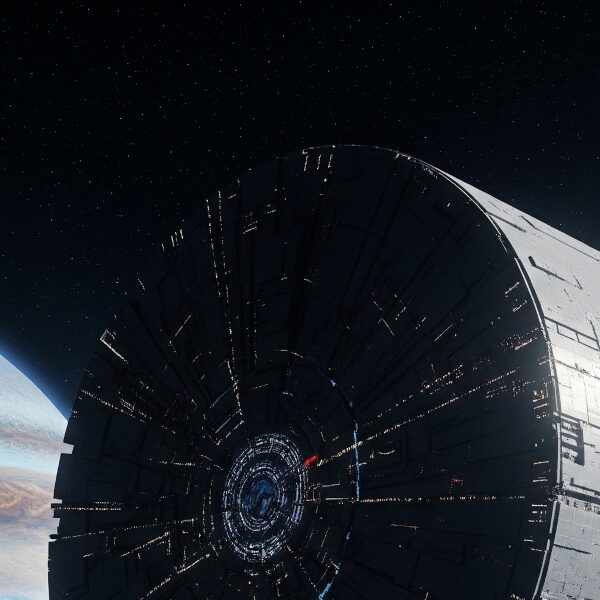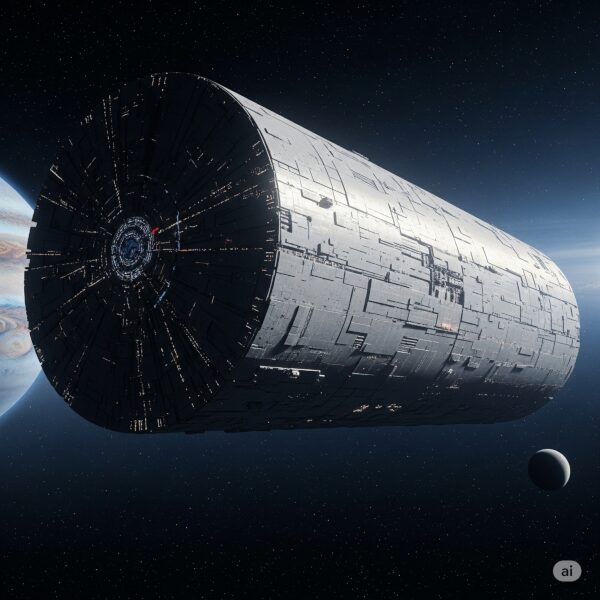Rama’s Rendezvous
Rama’s Rendezvous: Delve into Arthur C. Clarke’s classic “Rendezvous with Rama” – a captivating tale of humanity’s first encounter with an enigmatic alien megastructure.
Introduction
- Introduction
- Section 1: For the Uninitiated, or “Why You Should Give Sci-Fi a Go, Darling”
- Section 2: For the Seasoned Traveller, or “A Cynic’s Guide to Cosmic Indifference”
- Section 3: For the Devoted Fan, or “Diving Deeper into Rama’s Enigma”
- Major Works
- Conclusion
- The Left Hand of Darkness: Androgynus Vita (Androgynous Life)
and the Quest for Diverse Existence and Harmonious Coexistence
Ah, “Rendezvous with Rama”! If you’ve ever gazed up at the night sky and wondered, “What else is out there?”, then this delightful piece of science fiction is rather precisely what the doctor ordered. Imagine, if you will, a vast, enigmatic object hurtling through our solar system. Not a natural asteroid, oh no. This is something clearly… other. It’s a cosmic riddle, a gargantuan puzzle box, and humanity, with its insatiable curiosity, simply must take a peek inside. Arthur C. Clarke, with his unparalleled knack for blending scientific rigour with pure wonder, invites us on this extraordinary journey. It’s less a story of conflict and more a gentle, contemplative exploration of the sublime unknown. Utterly captivating.
Section 1: For the Uninitiated, or “Why You Should Give Sci-Fi a Go, Darling”
Now, I know what some of you might be thinking: “Science fiction? All those spaceships and laser beams? Not really my cup of tea.” And I quite understand! Many perceive it as a genre exclusively for those who can recite the warp core mechanics of a starship at a moment’s notice. But “Rendezvous with Rama” is rather different. It’s like finding a mysterious, beautifully wrapped present on your doorstep. You don’t know what’s inside, but the sheer allure of the unknown compels you to untie the ribbon.
Imagine you’re on a long-haul flight, peering out the window, and suddenly, through a break in the clouds, you glimpse something utterly astonishing – a structure so immense, so perfectly formed, it takes your breath away. That’s the feeling “Rama” evokes. It’s less about battling aliens and more about the quiet awe of discovery. Think of it as a grand expedition, like venturing into the depths of the Amazon or climbing Everest, but set amongst the stars. You don’t need a PhD in astrophysics to appreciate the sheer wonder of stumbling upon something truly alien and magnificent. It’s a gentle nudge, a polite invitation to ponder the vastness of existence, without any of the usual sci-fi theatrics. And honestly, isn’t a bit of cosmic wonder a lovely antidote to the mundane?

Section 2: For the Seasoned Traveller, or “A Cynic’s Guide to Cosmic Indifference”
For those of us already quite familiar with the cosmic ballet, “Rendezvous with Rama” offers a rather delicious sense of quiet dread, doesn’t it? It’s Clarke at his most chillingly elegant. Unlike many a space opera where humanity is either the universe’s plucky hero or its tragic victim, Rama presents us with something far more unsettling: utter, magnificent indifference. The Ramans aren’t here to conquer, nor to uplift; they’re simply… passing through. Their colossal vessel, a perfect cylinder of engineering marvel, orbits our sun, offers a brief, tantalising glimpse into an alien psyche, and then departs, leaving us none the wiser.
One might almost feel a pang of existential despair at the sheer, unfeeling pragmatism of it all. Here we are, scurrying about, brimming with our little hopes and fears, desperate for contact, for answers, for meaning. And what do we get? A ship that’s essentially a cosmic vending machine, dispensing no profound truths, no grand revelations, just… a highly efficient means of transport for its unseen builders. It’s a stark, perhaps even brutal, reminder that the universe owes us no explanations, no fellowship. And honestly, darling, sometimes that’s just the way it is. To expect otherwise would be terribly naive, wouldn’t it? Still, perhaps this cosmic indifference is precisely what we need – a humble reminder that our parochial concerns are but a whisper in the vast, echoing silence. And if embracing such a perspective occasionally leads to a richer understanding of ourselves, well, that’s hardly a punishment, is it?

Section 3: For the Devoted Fan, or “Diving Deeper into Rama’s Enigma”
Right, fellow aficionados, let’s get down to the brass tacks, shall we? “Rendezvous with Rama” isn’t merely a fantastic story; it’s a masterclass in hard science fiction, presenting a truly plausible encounter with the utterly alien. The sheer scale and meticulous detail of Rama’s interior – the cylindrical sea, the “cities” of perfectly geometric shapes, the bizarre biological automatons – are breathtaking. Clarke’s ability to conjure such an immense, functioning alien ecosystem within a contained environment is truly unparalleled.
Consider the “biots,” for instance. These aren’t your typical little green men or slithering monsters. They’re biological robots, perfectly adapted to their environment, performing their functions with a chilling, mechanical precision. Their interactions with the human explorers are utterly devoid of emotion or comprehension, highlighting the vast chasm between our forms of intelligence. And what about the mystery of the “New York” building, or the “trees” that emit light? Every corner of Rama sparks new questions, new theories. The genius lies in what Clarke doesn’t tell us, the magnificent lacunae that truly make the imagination soar. It’s the ultimate “show, don’t tell” narrative, allowing the grandeur of the unknown to speak for itself. It’s a perfect encapsulation of Clarke’s often-quoted third law: “Any sufficiently advanced technology is indistinguishable from magic.” And Rama, my dears, is pure, unadulterated magic.

Major Works
Arthur C. Clarke, the grand master himself, has graced us with an abundance of literary treasures. If “Rendezvous with Rama” has piqued your interest, you simply must explore some of his other iconic works:
- 2001: A Space Odyssey: The monolithic classic that needs no introduction. A profound exploration of artificial intelligence, alien contact, and human evolution. A masterpiece of cinematic and literary wonder.
- Childhood’s End: A truly thought-provoking tale about the arrival of the Overlords, a seemingly benevolent alien race, and their profound impact on humanity’s future. It’s a philosophical bombshell.
- The Fountains of Paradise: A breathtaking vision of a space elevator and humanity’s ambition to reach for the stars. A testament to Clarke’s engineering foresight and imaginative power.
Conclusion
So there we have it, a little expedition into the magnificent void of “Rendezvous with Rama.” It’s a story that gently reminds us of the vastness of the cosmos and our place within it – often a very small, very curious place indeed. Clarke, with his characteristic elegance, presents us not with answers, but with glorious, tantalising questions. It’s a quiet marvel, a testament to the enduring power of exploration and the profound beauty of the unknown. If you’ve ever yearned for a journey that expands your mind without resorting to gratuitous explosions, then this is your ticket. Go on, give it a read. You might just find yourself staring at the stars with a newfound sense of wonder.

The Left Hand of Darkness: Androgynus Vita (Androgynous Life)
and the Quest for Diverse Existence and Harmonious Coexistence
Related Articles
-
Against Stupidity: The Allure of THE GODS THEMSELVES!

Discover Isaac Asimov’s “The Gods Themselves Asimov,” a Hugo and Nebula Award-winning novel exploring parallel universes, alien life, and the profound consequences of humanity’s pursuit of limitless energy.
-
Jonathan Livingston Seagull Meaning

Explore the profound Jonathan Livingston Seagull Meaning. This allegorical tale by Richard Bach invites readers to soar beyond limits and find their true purpose. A journey of self-discovery.



Leave a Reply